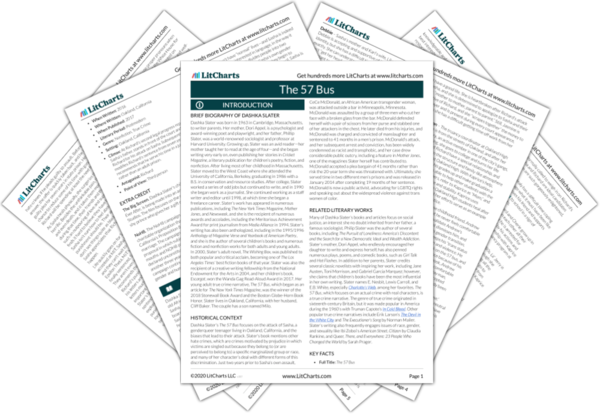Agender Quotes in The 57 Bus
Most of us see gender and sexuality and romance as one big interconnected tangle of feelings—this is who I am, this is who I’m attracted to, this is who I love. But as Sasha began exploring the topic online, they found that some people had developed language for combing the tangle into individual strands. In these online conversations, the word sex referred purely to biology—the chromosomes, organs, and anatomy that define male and female from the outside. Gender was the word for what people felt about themselves, how they felt inside. Sexuality was the category for who you were physically attracted to. Romantic was the category for who you felt romantic attraction to. And there was a whole array of distinctions within each category as well. It was like a gigantic menu, with columns and columns of choices.
Discovering the existence of genderqueer identity felt like discovering a secret room. All this time there had been just two rooms: male and female. Now it turned out there was another room—one that could be furnished however you wanted. The more time Sasha spent in the room, the more comfortable it felt. But the person who lived in this new room still had a boy’s name—Luke. By the second half of sophomore year, that name clearly no longer fit.
“I don’t want for people to think of me as a he, and when they say he, not only does it reinforce in their brains that I am a he, it also reinforces in the brains of the people who are listening,” Sasha explains. “It doesn’t really directly affect me, at least to hear it—it’s more like, Huh, that’s not right. And when people use the right pronoun, it feels validating.”
It was tough sometimes, watching Sasha navigate a world that didn’t even have a category for them. Occasionally, Debbie wished Sasha would ease up a little—resist correcting well-meaning relatives who said he instead of they, for example. But there was something admirable about it, too, Karl pointed out. Knowing how shy Sasha was, he admired Sasha’s newfound willingness to speak up, to stand out, to be seen.
“A passenger on an Oakland, Calif., public bus received burns to his legs after his kilt was set on fire,” UPI wrote. The word kilt seemed to have gotten lodged in the minds of reporters. It was in every report, as if Sasha had been on the way home from bagpipe practice. The Daily Mail, in the United Kingdom, even illustrated the report with a photo of a kilt, explaining a kilt is “the national dress of Scotland.”
“What I want is for people to be confused about what gender I am,” Sasha explained later. That didn’t happen too often—people tended to see Sasha as male. So it was a nice change to be seen as female.
“We do not understand your actions,” Debbie went on. “But we also think that hatred only leads to more hatred and anger. We don’t want you to come out of prison full of hate. Following the incident, communities near and far affirmed Sasha’s—and everyone’s—right to not be harassed or hurt or bullied for how they dress, or whether they are gay or trans or agender. We truly hope that you will gain some understanding and empathy in the years to come. Maybe sometime in the future you will be the one coming to the aid of someone being bullied.”












